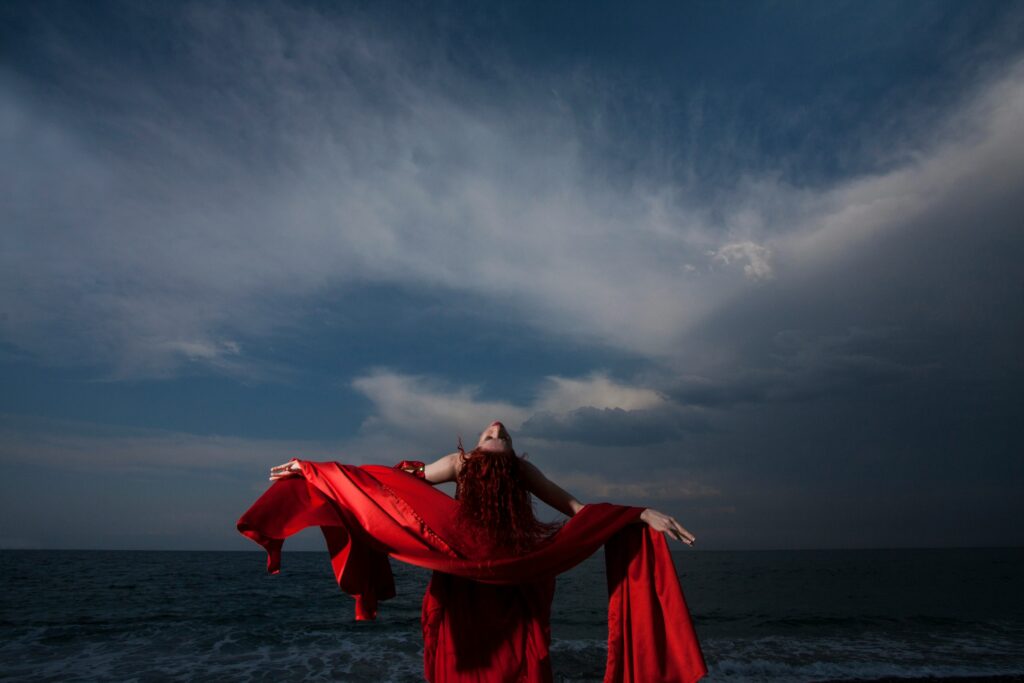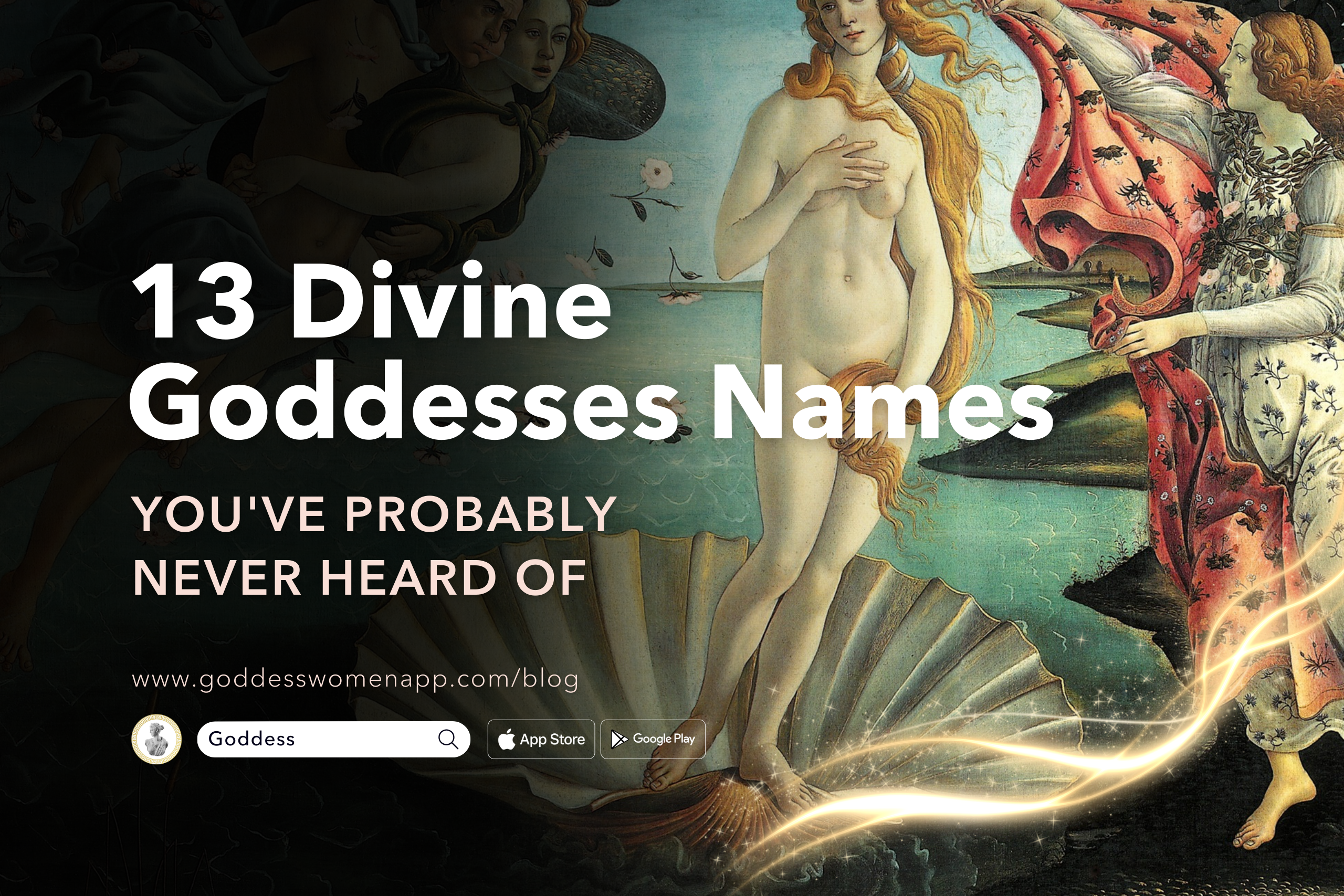Table of Contents
Introduction
In the tapestry of world mythology, the names of goddesses resound with power, mystery, and allure. From the sacred peaks of Mount Olympus to the mystical rivers of Celtic lore, these divine figures have been venerated, feared, and adored. Goddesses names carry the weight of the worlds they govern—be it the fertile earth, the treacherous sea, or the boundless sky. They are woven into the very fabric of human history, embodying ideals of love, wisdom, war, and fertility. Greek mythology introduces us to a pantheon where the Greek goddess of wisdom, Athena, and the primordial mother, Gaia, stand as pillars of power. Meanwhile, the epic poetry of ancient cultures sings praises to the Norse goddess Freyja and the Hindu goddess Saraswati, celebrating their eternal youth and sacred wisdom.
Begin Your Divine Journey: Take the Goddess Archetype Quiz Today

In Roman mythology, figures like Venus, the goddess of love beauty, echo through the ages, their stories intertwined with those of gods, humans, and creatures of myth. The early Greek goddesses and their Roman counterparts share tales of creation, destruction, and love that have inspired countless works of art, literature, and sacred poetry. Among these stories, we find the Titan goddesses, primordial goddesses, and even minor goddesses, each playing a crucial role in the cosmic ballet.
The allure of divine femininity spans across many cultures, offering a kaleidoscope of deities from the Norse goddess of the wild animals to the Lithuanian goddess of the sacred flame. These names, be they of a river god or a mountain nymph, resonate with the raw energy and profound magic inherent in nature and the cosmos. The nine muses of Greek mythology, presiding over arts ranging from epic poetry to pastoral poetry, embody the creative spirit that fuels both ancient and modern endeavors.
The goddess names are not just relics of the past; they continue to inspire modern narratives, art, and even baby names. Many parents, captivated by the rich stories and attributes of these deities, choose names for their baby girls that echo the strength, beauty, and wisdom of goddesses. From Athena, the goddess of wisdom, to Freyja, the Norse deity of love and war, these names carry with them a legacy of empowerment and inspiration.

The Allure of Divine Femininity
At the heart of many ancient tales and myths lies the concept of divine femininity—a force that is both nurturing and fierce, embodying the duality of creation and destruction. Goddesses names across various mythologies encapsulate this duality, presenting figures that are as complex as they are captivating. The Greek goddesses, with their epic tales of love, revenge, and intervention in the affairs of mortals, offer a glimpse into the early human attempts to understand the forces of nature and the human condition. Similarly, the stories of the Celtic goddess and the Roman goddess reveal a reverence for the natural world and its cycles, highlighting the goddesses’ roles as protectors of the earth and its creatures.
The concept of divine femininity extends beyond the nurturing aspects of mother earth to include the strategic might of goddesses of war and the boundless creativity of the muses. These deities, whether they preside over the sacred waters or the sacred flame, invite us to explore the depths of our own intuition, strength, and artistic potential. The stories of these goddesses, from the Greek titan of early mythology to the winged goddess of Roman lore, inspire awe and respect for the feminine principle as a source of life, wisdom, and magic.
As we delve into the lesser-known goddesses names from various cultures, we uncover a rich heritage of mythological names that offer insight into how ancient peoples understood the world around them. These names, each carrying a story of magic, power, and wisdom, serve as a bridge between the past and present, reminding us of the enduring legacy of the goddesses and their significance in human history.
Through exploring these divine names, we connect with other cultures and epochs, gaining a deeper appreciation for the universality of the divine feminine. The goddesses, with their myriad aspects and attributes, challenge us to see the world through a lens of wonder, respect, and reverence for the forces that govern life and the natural world.

Goddesses Names: A Tapestry of Divine Femininity
The names of goddesses carry the whispers of ancient civilizations, telling stories of power, creation, and the sacred feminine. Across different cultures, these names not only identify but also convey the essence and authority of the deity they represent.
Greek Mythology: The Pantheon of Power and Wisdom
Greek mythology is rich with goddesses who embody various aspects of life, nature, and the cosmos. From the wisdom and warfare of Athena to the hearth and home protected by Hestia, each Greek goddess plays a pivotal role in the myths and rituals of ancient Greece.
Greek Goddess: Athena, The Emblem of Wisdom and Warfare
Athena, one of the most revered Greek goddesses, symbolizes wisdom, courage, and strategic warfare. Born from the head of Zeus, she is a virgin goddess who aids heroes and cities in their time of need, embodying the intellectual and martial prowess of the Greek pantheon.
Hindu Goddess: Saraswati, The Flow of Knowledge and Arts
In Hindu mythology, Saraswati stands as the goddess of knowledge, music, art, wisdom, and learning. She is depicted holding a veena, with books and a rosary, symbolizing the eternal flow of knowledge and the arts. Saraswati’s worship underscores the value placed on education and artistic expression in Hindu culture.
Celtic Goddess: Brigid, The Flame of Inspiration and Healing
The Celtic goddess Brigid is revered as a figure of healing, poetry, and smithcraft. Known also for her association with holy wells and sacred flames, Brigid’s influence spans across the Celtic regions, embodying the interconnectedness of life, art, and the earth.
Through these divine figures, we glimpse the diverse expressions of femininity and power that goddesses represent. Each culture brings its unique perspective to the divine, yet all share a common reverence for the roles these deities play in the natural world and human life. The names of these goddesses, echoing through time, continue to inspire and influence those who find meaning in their stories and symbols.
1. Anahita – The Persian Water Goddess
In the pantheon of ancient deities, Anahita reigns as the Persian water goddess, a figure of purity, fertility, and wisdom. Her name, etched in the annals of Persian mythology, resonates with the sacredness of water—a source of life and sustenance. Anahita, celebrated in sacred poetry and hymns, was not merely a minor goddess; she was a divine force overseeing the sacred waters that nourished the earth and its inhabitants. Her worship involved rituals that highlighted the primordial importance of water, reflecting its essential role in the survival and prosperity of civilizations.
Anahita’s attributes extend beyond her dominion over rivers and lakes; she embodies the facets of mother earth, fertility, and wisdom. As a goddess of fertility, she was invoked by those seeking the blessing of children and abundant harvests. Her connection to the sacred waters mirrors the reverence seen in other cultures, where goddesses like the Greek titan goddesses and the Roman goddess of the moon held sway over natural elements. Anahita’s legacy is a testament to the universal recognition of water’s vital essence and its personification in the form of a powerful, nurturing deity.

2. Bendis – The Thracian Moon Goddess
Bendis, the Thracian moon goddess, brings to mind the mystique and allure of the nocturnal luminary she personifies. Her name, though less familiar than those of Greek goddesses, carries the enchantment of moonlit nights, wild animals, and the untamed wilderness.
3. Eostre – The Anglo-Saxon Goddess of Spring
Eostre, the Anglo-Saxon goddess of spring, personifies the rejuvenation of the earth after the dormant winter months. Her name, evoking the dawn and the resplendent morning dew, is entwined with the very essence of renewal and rebirth.
Her symbols—a hare and an egg—embody fertility and new beginnings, elements that have trickled down into modern Easter celebrations. Eostre’s connection to the earth and its cycles of growth and renewal places her among the revered pantheon of goddesses like the early Celtic goddess and the Hindu goddess of fertility, highlighting the shared human endeavor to understand and venerate the forces of nature.
4. Freyja – The Norse Goddess of Love and War
Freyja, the Norse goddess whose domain encompasses both love and war, exemplifies the complex duality of divine femininity. As a deity who presides over the most tender of emotions and the fiercest of battles, Freyja’s essence is woven into the fabric of Norse mythology. Her chariot, drawn by cats, symbolizes her dominion over love beauty, while her warrior aspect is evident in her selection of the bravest fallen warriors for the afterlife in Fólkvangr. Freyja’s name, synonymous with “lady,” resonates through time as a testament to her power and grace. Her worship included practices that celebrated her dual nature, invoking her blessings for both heartfelt love and victory in conflict. This blend of tenderness and strength places Freyja among the most revered Norse goddesses, reflecting the ancient Norse value of harmony between opposing forces.
5. Ixchel – The Mayan Goddess of Childbirth and Medicine
Ixchel, revered in Mayan culture as the goddess of childbirth and medicine, embodies the life-giving aspects of mother earth. Her name, evoking the sacred waters and the nurturing rain, highlights her role as a protector of women during childbirth and a healer. Ixchel’s domain extends to the moon, linking her to the cycles of women’s bodies and the natural world. She is often depicted with a serpent, symbolizing her wisdom and transformative power, and a water jar, representing the rainfall that nourishes the earth.
6. Mami Wata – The African Water Spirit
Mami Wata, a pantheon of water spirits revered across Africa, embodies the mystique and allure of the water’s depths. These deities, often depicted as mermaids, command the power of the waters, overseeing fertility, wealth, and the mysteries of the unknown. Mami Wata’s followers celebrate her through rituals and offerings, seeking her blessings for prosperity and protection. Her depiction as a figure of beauty and seduction, often with a mirror and a snake, symbolizes her dominion over wealth and the transformative power of the waters.
7. Nüwa – The Chinese Creator Goddess
Nüwa, the Chinese creator goddess, is celebrated for her role in molding humanity and repairing the heavens, a testament to her ingenuity and compassion. With her divine wisdom and power, Nüwa crafted the first humans from the yellow earth, breathing life into them and establishing the foundation of human society. Her act of mending the sky, using stones of seven different colors, symbolizes her as a guardian of the cosmos and the earthly realm.

8. Oshun – The Yoruba Goddess of Beauty, Love, and Fertility
Oshun, the Yoruba goddess revered for her beauty, love, and fertility, radiates the warmth and vitality of the rivers over which she presides. As a deity of water, she embodies the nurturing flow of life, enriching the land and its people with her abundant, life-sustaining energies. Oshun’s rituals often involve sweet waters and honey, symbols of her sweetness and generosity. Her devotees turn to her for matters of the heart, seeking her blessings for love, family, and childbirth. The worship of Oshun reflects the Yoruba culture’s deep respect for the sacred waters, recognizing them as sources of life, joy, and fertility.
9. Saraswati – The Hindu Goddess of Knowledge and Arts
Saraswati, the Hindu goddess of knowledge, music, art, and wisdom, is celebrated as a source of pure, flowing creativity and insight. She is often depicted with a veena, a musical instrument, representing the harmony of all arts and sciences. As the consort of Brahma, the creator god, Saraswati’s essence is intertwined with the cosmic creation, symbolizing the river of consciousness that enriches the mind and spirit. Her festivals, particularly Vasant Panchami, are occasions of joy, marked by music, poetry, and learning, underscoring the cultural reverence for education and artistic expression in Hindu tradition.
10. Sekhmet – The Egyptian Goddess of War and Healing
Sekhmet, with her lioness head, embodies the dual aspects of a warrior and healer, a testament to the ancient Egyptians’ complex understanding of divinity. As the goddess of war, she was a protector of pharaohs and a leader of warriors, her fierce visage instilling awe and respect. Yet, as a goddess of healing, Sekhmet’s powers were sought to ward off disease and bring about healing, illustrating the balance between destruction and regeneration. Her temples were centers of both worship and healing, where priests and priestesses served in her name, invoking her powers through rituals and sacred hymns.

11. Tanit – The Carthaginian and Phoenician Goddess of Fertility
Tanit, venerated as the chief deity of Carthage, stands as a symbol of fertility and the patroness of the city. Her worship was central to Carthaginian identity, reflecting her roles as a giver of life and a guardian of the community. Tanit’s iconography, often featuring the symbol of the triangle, represents the feminine principle and her association with fertility and the regeneration of life. As a goddess of both the heavens and the earth, Tanit was a bridge between the divine and the mortal, ensuring the prosperity and protection of her people.
12. Umay – The Turkic Goddess of Fertility and Well-being
Umay, revered in Turkic mythology, embodies the protective and nurturing aspects of motherhood. As a goddess of fertility and well-being, she watches over families, especially mothers and children, ensuring their health and happiness. Her depiction often includes symbols of the moon and fertility, illustrating her connection to the cycles of life and the nurturing energies of the cosmos. Umay’s worship reflects the ancient Turkic peoples’ respect for the divine feminine as a source of life and protector of the family unit.
13. Yemaya – The Yoruba Orisha of the Living Ocean
Yemaya, the mother of all orishas in Yoruba religion, reigns over the living ocean, embodying the essence of motherhood, fertility, and the sea. She is the guardian of the deep, the provider of rich resources, and the protector of small children and the home. Her devotees honor her with offerings and rituals by the water’s edge, seeking her blessings for prosperity, protection, and familial harmony. Yemaya’s presence is palpable in the gentle roll of ocean waves and the nurturing embrace of the sea, reminding us of the profound connections between life, water, and the divine feminine.
Through these goddesses, we see a rich tapestry of divine femininity that spans cultures and continents. From the sacred rivers of Yorubaland and the fertile lands of Carthage to the cosmic order of Hindu and Egyptian mythologies, these deities embody the diverse expressions of power, protection, and nurturing that have guided and inspired humanity across ages.
In exploring the enchanting realm of goddess names and their profound meanings, we journey through ancient cultures and timeless tales that celebrate the divine feminine. From the beauty and love embodied by Aphrodite to the wisdom and courage of Athena, each goddess name carries a legacy of strength, grace, and inspiration. The stories of these deities, whether rooted in Greek, Roman, or Hindu mythology, offer us a glimpse into the values and beliefs that have shaped human civilization across the ages. They remind us of the power, complexity, and depth of the feminine divine, inviting us to explore and honor the myriad aspects of goddess energy within our own lives and the world around us.
As we reflect on the virtues and tales of these divine figures, one might wonder, “Which goddess archetype resonates most with me?” Whether drawn to the fierce independence of Artemis or the creative flow of Saraswati, there’s a goddess to inspire every path and passion.
To discover which goddess archetype aligns with your spirit, I invite you to embark on a journey of self-discovery with the Goddess App. Take the archetype quiz and uncover the goddess energies that resonate with your soul. Let the wisdom of the ancients guide you to a deeper understanding of yourself and your unique place in the tapestry of life.
Begin Your Divine Journey: Take the Goddess Archetype Quiz Today





